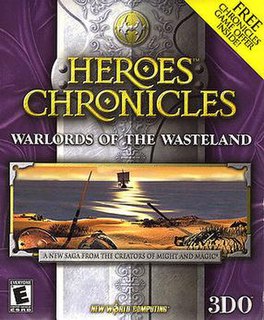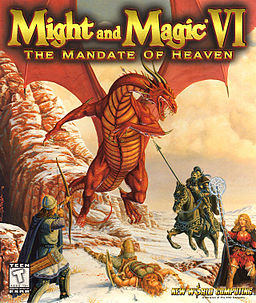 W
WHeroes Chronicles is a series of turn-based strategy video games developed by Jon Van Caneghem through New World Computing and published by the 3DO Company. The series was intended to introduce a new audience, such as casual gamers, to the Heroes of Might and Magic series. As part of that strategy, each installment of Chronicles was released as a low-cost episode containing a relatively short single-player campaign, and the difficulty level of each game was kept low. All Chronicles games are based on a limited version of the Heroes of Might and Magic III game engine, although the ability to play scenario maps and multiplayer games is not included in any Chronicles title.
 W
WHeroes of Might and Magic II: The Succession Wars is a turn-based strategy video game developed by Jon Van Caneghem through New World Computing and published in 1996 by the 3DO Company. The game is the second installment of the Heroes of Might and Magic series and is typically credited as the breakout game for the series. Heroes II was voted the sixth-best PC game of all time by PC Gamer in May 1997.
 W
WHeroes of Might and Magic III: The Restoration of Erathia is a turn-based strategy game developed by Jon Van Caneghem through New World Computing originally released for Microsoft Windows by the 3DO Company in 1999. Its ports to several computer and console systems followed in 1999–2000. It is the third installment of the Heroes of Might and Magic series.
 W
WHeroes of Might and Magic III: Armageddon's Blade is the first of two expansion packs for the turn-based strategy game Heroes of Might and Magic III. It was developed by New World Computing for Microsoft Windows and released by the 3DO Company in 1999.
 W
WHeroes of Might and Magic IV is a turn-based strategy game developed by Gus Smedstad through New World Computing and published by the 3DO Company for Microsoft Windows-based personal computers in 2002. A Macintosh port was subsequently developed by Contraband Entertainment and released by the 3DO Company. The fourth installment of the popular Heroes of Might and Magic franchise, it is the sequel to Heroes of Might and Magic III, and was the last to be developed by New World Computing.
 W
WHeroes of Might and Magic: Quest for the Dragon Bone Staff is a 2001 video game released on the PlayStation 2. Though 3DO did not advertise it as such, the game is an enhanced remake of King's Bounty. It is primarily a graphics enhancement and it appears that little of the text has changed. Because of its dated gameplay, the game bears little relation to the rest of the Heroes of Might and Magic series.
 W
WMight and Magic IX is a role-playing video game, the last developed by New World Computing for Microsoft Windows and released in 2002 by the 3DO Company. It is the sequel to Might and Magic VIII: Day of the Destroyer. It is the first to feature a significant game engine overhaul since 1998's Might and Magic VI: The Mandate of Heaven. Powered by the Lithtech 1.5 engine, it was also the first game in the series to feature fully three-dimensional graphics. During production, it was known by the working title of Might and Magic IX: Writ of Fate, and it is usually referred to by that title by fans of the series.
 W
WMight and Magic VI: The Mandate of Heaven, commonly abbreviated to Might and Magic VI or simply MM6, is a role-playing video game developed by New World Computing and published by 3DO in 1998. It is the sixth installment in the Might and Magic series, the sequel to Might and Magic V: Darkside of Xeen and the first of the Might and Magic titles to take place in the same world as Heroes of Might and Magic. It continues the storyline of Heroes of Might and Magic II, and takes place at the same time as Heroes of Might and Magic III in the series chronology.
 W
WMight and Magic VIII: Day of the Destroyer is a role-playing video game developed for Microsoft Windows by New World Computing and released in 2000 by The 3DO Company. It is the eighth game in the Might and Magic series. The game received middling critical reviews, a first for the series, with several critics citing the game's length and its increasingly dated game engine, which had been left fundamentally unaltered since Might and Magic VI: The Mandate of Heaven in 1998. The game was later ported to PlayStation 2 in Japan and published by Imagineer on September 6, 2001.